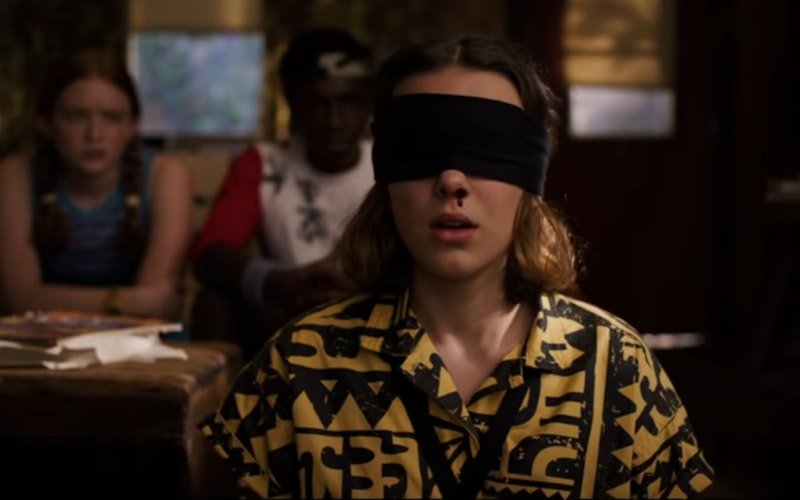
TV
Powers, Principalities, and Other Stranger Things
Stranger Things season three returns to Hawkins, Ind., which is once again the center of evil, otherworldly activity. The Mind Flayer has escaped the Upside Down and set up shop in an abandoned warehouse, where it is gathering human hosts and devouring them. Unless our teen heroes can muster a miracle, Hawkins will be consumed. All of this takes place against a specific 1980s setting—much of the action is set at a new mall anchored by The Gap, Sam Goody, and JC Penney—yet there is a much older reference point that Stranger Things mirrors: the New Testament’s view of the world as a contested battleground where Sin roams.
In her work on Romans, Fleming Rutledge insists that Sin and Death be capitalized in recognition that the New Testament presents them as “independent cosmic Powers.” Sin and Death are Powers who are “untiring, malevolent, and extremely clever” in their war against God’s creation. What is the glowing mass of evil that produces the Mind Flayer if not untiring, malevolent, and extremely clever—at war, for some unknown reason, with Hawkins, Ind.?
The Mind Flayer is a relentless Power, an intentional agent that consumes human beings made in the image of God. During one harrowing sequence set at a hospital, the kids manage to defeat two humans who have been turned into unwilling hosts by the Mind Flayer. Their wounded bodies dissolve into a pile of red, pulsating flesh that slithers across the hospital linoleum in search of another Hawkins resident to steal, kill, and destroy. In Stranger Things, the Mind Flayer is a Power akin to Sin and Death. The series invites us into a view of the world that is more enchanted than empirical; more cosmic than cloistered; more spiritually contested than neutral and banal. It’s more New Testament than modern day.
The clearest example of Stranger Things’ conception of Sin as a Power is seen in the tragedy that befalls Billy (Dacre Montgomery). For the majority of season three, Billy is under the Power of the Mind Flayer as the first of the flayed. While certainly not a model of virtue before this happens (aside from that great hair), Billy, under the Powers, participates in even more evil. His usual bullying and intimidation degenerates into acts of reprehensible violence. Attacking and kidnapping his fellow lifeguard, Heather (Francesca Reale), Billy presents her, bound and gagged, at the foot the Mind Flayer as if she were a sacrifice upon an unholy altar. Later, in a rare moment of lucidity while trapped in a sauna by Eleven (Millie Bobby Brown) and her friends, Billy howls that the Mind Flayer “made me do bad things.” There are shades of New Testament truth in this traumatic confession. It would be erroneous to place the responsibility of moral wrongdoing entirely outside of us. Yet, as Billy reminds us, it would also be an error to think of Sin as only volitional choices we have made.
In this way Stranger Things takes the idea of Sin and Death as Powers quite seriously, painting them with New Testament textures. The apostle Paul reminds us moderns that Sin is a Power which we all are indeed “under” and which sometimes leads us to do what we hate. Left to ourselves, humanity is as helpless under Sin as the flayed are under the Mind Flayer. Stranger Things serves as a corrective rebuke to the modern mind, reminding us that Sin is a Power from which we need freedom, not simply an act of disobedience which we must avoid.
TC Podcast: Stranger Things - Grace in the Upside Down
It’s worth noting that after three seasons, Stranger Things has given only the faintest hints as to how its Powers—the Upside Down and the Mind Flayer—work. This forces viewers to stomach the idea that the Mind Flayer is such a devastating, relentless Power that seeking to explain it away might be besides the point. Andrew Delbanco, an American Studies professor at Columbia University, argues that “[a] gulf has opened up in our culture between the visibility of evil and the intellectual resources available for coping with it.” Stranger Things wants us to sit in that gulf, considering that there are Powers of destruction in the world that go beyond our rationalist resources. As a result, Stranger Things counters our modern desire to understand the forces of Sin, Evil, and Death in exclusively intellectual terms.
Instead, the show places viewers in a contested world where evil is a Power and its existence is not primarily for us to understand, but to counteract. The New Testament tells us that such a world is indeed our reality. Here, too, Stranger Things follows the New Testament pattern, for the Powers are defeated only through means of sacrifice (in this season, we witness the loss of two key characters) and the forming of an unlikely beloved community (along with the usual gang, Eleven in this season is joined by new characters such as Erica, played by Priah Ferguson, and Robin, played by Maya Hawke).
Since Sin is a Power that extends beyond the self and our volitional choices, the remedy must come from beyond the self, as well. The redemptive power of sacrifice and community in Stranger Things are again reminiscent of the New Testament and its chief victor over Sin, Christ himself, whose sacrifice frees his people from Sin’s dominion and who institutes the new beloved community of the church. In response to this great gift, we resist Sin however we continue to encounter it, seeking to serve not the Mind Flayer, but God's perfect will.
Think Christian Podcast: Spiritual Warfare (Stranger Things, Midsommar)
Topics: TV